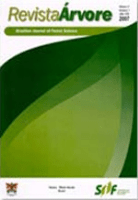
REVISTA ARVORE
Scope & Guideline
Connecting Scholars to Advance Forestry Science
Introduction
Aims and Scopes
- Forest Ecology and Biodiversity:
The journal emphasizes studies related to the ecology of forest ecosystems, including species diversity, regeneration, and the effects of anthropogenic disturbances on forest structure and function. - Sustainable Forestry Practices:
Research aimed at improving sustainable management practices in forestry, including the selection of tree species, silvicultural techniques, and the economic analysis of forest operations. - Climate Change Impact Assessment:
The impact of climate change on forest ecosystems is a consistent theme, with studies examining species distribution, physiological responses, and adaptation strategies. - Forest Products and Wood Science:
The journal covers research related to the properties and applications of forest products, including timber quality, wood preservation, and innovative uses of wood and biomass. - Plant Propagation and Seed Technology:
There is a strong focus on methodologies for seed germination, plant propagation, and the development of improved planting materials for various tree species. - Biological Interactions and Pest Management:
Studies exploring the interactions between forest species and pests, including biological control methods and the effects of herbicides on seedlings.
Trending and Emerging
- Climate Resilience and Adaptation Strategies:
There is a growing focus on understanding how forests can adapt to climate change, including studies on species resilience and the development of management practices that enhance forest stability. - Ecological Restoration and Rehabilitation:
Research addressing ecological restoration, particularly in degraded areas, is becoming more prominent, reflecting a global emphasis on ecosystem recovery and biodiversity conservation. - Innovative Propagation Techniques and Genetic Studies:
Emerging interest in advanced propagation techniques and genetic studies to enhance the quality and adaptability of tree species for various ecological conditions. - Impacts of Environmental Stressors:
Increased research on how environmental stressors, such as water deficit and soil quality, affect forest health and productivity indicates a trend towards understanding and mitigating these challenges. - Integration of Technology in Forest Management:
The application of technology, including remote sensing and data analysis methods, is increasingly evident in studies aimed at improving forest management and conservation practices.
Declining or Waning
- Traditional Timber Harvesting Techniques:
Research on conventional timber harvesting methods has seen a decline, possibly due to a growing focus on sustainable and innovative forestry practices. - General Agricultural Practices:
Studies that broadly address agricultural practices without a direct link to forestry or ecological impacts are less frequently published, indicating a narrowing of focus toward forest-specific research. - Non-ecological Aspects of Forest Management:
There seems to be a reduced emphasis on purely economic analyses of forest management that do not incorporate ecological dimensions, reflecting a trend towards integrated approaches.
Similar Journals

CANADIAN JOURNAL OF FOREST RESEARCH
Transforming challenges into opportunities in forest research.Canadian Journal of Forest Research (ISSN: 0045-5067, E-ISSN: 1208-6037), published by Canadian Science Publishing, stands as a leading platform for disseminating cutting-edge research in the field of forestry and ecological sciences. With an impressive impact factor and a steady reputation for high-quality publications, this journal occupies a prestigious position indicated by its Q1 ranking in Forestry and Q2 in Ecology as of 2023, alongside commendable placements in global and planetary change studies. Covering a broad scope from sustainable forest management to the impacts of climate change on forest ecosystems, the journal encourages submissions that address contemporary challenges and innovations in forest research. Operating from its base in Ottawa, Canada, the Canadian Journal of Forest Research has been a cornerstone of academic discourse since 1974, offering researchers and professionals vital access to pioneering studies that inform policy and practice in forestry. Researchers, educators, and students alike will find this journal an indispensable resource for advancing knowledge and fostering collaboration in the vital realm of forest research.

FOREST PRODUCTS JOURNAL
Exploring the intersection of science and forest products.FOREST PRODUCTS JOURNAL is a prestigious publication dedicated to the advancement of knowledge in the field of forestry and forest products. Published by the Forest Products Society, this journal has established itself as a significant resource since its inception in 1968, offering valuable insights into the scientific, engineering, and technological aspects of wood products. With a commendable impact factor and categorized as Q2 in Forestry and Q3 in both Materials Science and Plant Science, it serves as an essential platform for researchers, professionals, and students alike. The journal's comprehensive scope covers topics from sustainable forestry practices to innovative material applications and forest management strategies, addressing critical challenges faced in the industry. Although it is not an Open Access journal, interested readers can access its contents through numerous academic databases, ensuring widespread availability to foster collaboration and advancement in forest-related sciences. The FOREST PRODUCTS JOURNAL is not only crucial for knowledge dissemination but also for promoting the sustainability and conservation of forest resources globally.
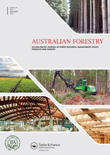
AUSTRALIAN FORESTRY
Fostering Collaboration for Environmental ProgressAustralian Forestry is an esteemed journal dedicated to advancing knowledge in the field of forestry and related environmental science. Published by Taylor & Francis Australia, this journal plays a pivotal role in disseminating high-quality research that spans various aspects of forestry, including sustainable management, conservation practices, and policy analysis. With an impact factor reflecting its significance in the academic community and a Scopus rank of #44 out of 174 in the category of Agricultural and Biological Sciences, Australian Forestry proudly holds a Q2 ranking in its field as of 2023. The journal has maintained a continuous publication record since its inception in 1936, with a commitment to addressing contemporary challenges within forestry. Researchers, professionals, and students alike are invited to engage with this vital resource that fosters insightful dialogue, innovative solutions, and a deeper understanding of forestry science.

International Journal of Forest Engineering
Fostering interdisciplinary insights for forest sustainability.International Journal of Forest Engineering, published by TAYLOR & FRANCIS INC, is a leading scholarly journal dedicated to advancing the fields of forestry and engineering. With an ISSN of 1494-2119 and an E-ISSN of 1913-2220, it has garnered a notable reputation with its Q1 ranking in Forestry and Q2 ranking in Agronomy and Crop Science as of 2023, reflecting its significant impact in agricultural and biological sciences. Operating without an open access option, the journal provides a platform for innovative research and practical applications within forest management, engineering practices, and related disciplines. Covering a span of articles from 2019 to 2024, this publication is essential for researchers, professionals, and students seeking to bridge theoretical knowledge with real-world forestry challenges. The journal’s commitment to fostering an interdisciplinary approach is evident in its diverse categories, supporting critical advancements towards sustainable forest practices and engineering solutions.
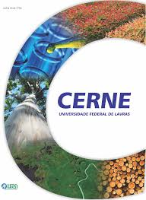
Cerne
Pioneering Research for the Future of ForestryCerne is a distinguished open-access journal dedicated to advancing knowledge in the field of forestry, published by the Universidade Federal de Lavras (UFLA). Since its inception in 1994, the journal has actively contributed to the global discourse on sustainable forest management and biodiversity conservation, presenting research findings that are both relevant and impactful. With its ISSN 0104-7760, Cerne aims to foster collaboration among researchers, professionals, and students, enhancing the understanding of forestry practices in Brazil and beyond. As of 2023, it holds a respectable Q3 ranking in the forestry category, further cementing its position within the academic community, illustrated by a Scopus ranking of #97 out of 174 in the Agricultural and Biological Sciences - Forestry field. Operating under an open-access model allows for wide dissemination of research outputs, ensuring that critical findings reach a broad audience, fueling further innovation and discovery in the field. With converged years extending from 2007 to 2024, Cerne continues to be a vital resource for anyone engaged in forestry research and practices.
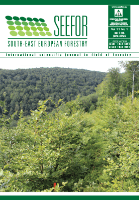
SEEFOR-South-East European Forestry
Empowering knowledge for the future of South-East European forestry.SEEFOR-South-East European Forestry is a premier open-access journal dedicated to advancing knowledge in the field of forestry and environmental science. Published by the CROATIAN FOREST RESEARCH INSTITUTE, this journal has been operational since 2010, providing a platform for research that focuses on the unique forestry dynamics of the South-East European region. With an ISSN of 1847-6481 and an E-ISSN of 1849-0891, SEEFOR is recognized for its commitment to disseminating high-quality research that addresses critical issues in forestry management, conservation, and sustainable development. The journal is indexed in Scopus, placing it within the third quartile (Q3) of forestry journals, reflecting its significance within the academic community. SEEFOR aims to connect researchers, practitioners, and policymakers, fostering collaboration and innovation in fostering sustainable forestry practices in Croatia and beyond. Submissions are welcome in a range of areas including forest ecology, policy development, and socio-economic impacts, making it an invaluable resource for professionals and students alike.
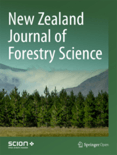
NEW ZEALAND JOURNAL OF FORESTRY SCIENCE
Pioneering Research in Ecology and Plant SciencesNEW ZEALAND JOURNAL OF FORESTRY SCIENCE (ISSN: 0048-0134; E-ISSN: 1179-5395), published by SCION, stands as a pivotal resource for researchers, professionals, and students dedicated to the fields of forestry, ecology, and plant sciences. With a strong commitment to open access since 2013, the journal promotes the dissemination of high-quality research and innovative practices within these disciplines, thereby fostering a greater understanding of the natural environment. The journal has achieved commendable rankings, being placed in the Q2 category in Ecology, Forestry, and Plant Science, reflecting its significant contribution to advancing knowledge and best practices in these areas. Based in Switzerland and published by SCION, a trusted name in forest research, the journal plays an integral role in shaping the dialogue around sustainable forest management and ecological conservation. As such, it serves as an essential platform for scholarly discourse and a valuable resource for anyone engaged in forestry and environmental studies.

Forestist
Advancing sustainable forestry through open dialogue.Forestist, published by AVES, is a pivotal open-access journal dedicated to the field of Forestry, providing a platform for researchers, professionals, and students to explore cutting-edge developments and research within the discipline since 1980. Operating from Turkey, this journal offers a unique opportunity for scholars to share their findings with a broad audience, contributing to the global discourse on sustainable forest management, conservation practices, and ecological research. With an impressive impact factor and a current categorization in the Q3 quartile for 2023, Forestist ranks among the essential resources in Agricultural and Biological Sciences, particularly within the realm of Forestry, as indicated by its Scopus ranking of #119 out of 174 journals. This publication is committed to fostering open access to knowledge, making research freely available while encouraging innovative studies that address the pressing challenges in forestry and environmental science.

FOREST SCIENCE
Connecting scholars and practitioners in forest science.FOREST SCIENCE, published by Oxford University Press Inc, is a pivotal journal in the field of forestry and ecological modeling, boasting an impressive track record since its inception in 1970. With an ISSN of 0015-749X and E-ISSN 1938-3738, the journal provides a valuable platform for the dissemination of high-quality research and studies that address contemporary challenges in forestry and ecology. It ranks in the Q2 category for both ecology and forestry and holds a Q3 ranking in ecological modeling according to the latest evaluations, illustrating its significant contribution to these fields. The journal is accessible through various options, facilitating broad readership and engagement within the academic community. As part of its commitment to advancing knowledge and practices in forest management and conservation, FOREST SCIENCE seeks to bridge theoretical research with practical applications, making it an indispensable resource for researchers, professionals, and students alike.

Central European Forestry Journal
Bridging research and practice in forestry for a greener tomorrow.Central European Forestry Journal, published by SCIENDO, is a pivotal platform dedicated to advancing research and knowledge in the field of forestry. Since its inception in 2009, this Open Access journal has provided scholars and practitioners with unrestricted access to cutting-edge research findings, promoting collaboration and innovation within the forestry community. Based in Poland, the journal serves as a crucial resource for researchers, professionals, and students alike, addressing critical topics relevant to the management, conservation, and sustainable utilization of forest resources. The journal holds a commendable Q2 ranking in Forestry, with a notable rank of 51 out of 174 and a 70th percentile in Scopus's Agricultural and Biological Sciences category. With converged publication from 2017 to 2024, the Central European Forestry Journal represents an essential avenue for disseminating knowledge and fostering dialogue in an increasingly important field.